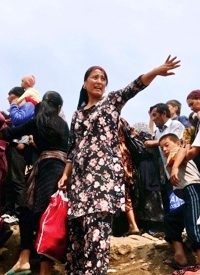
Ethnic violence is rocking Kyrgyzstan. Uzbek citizens of the central Asian nation are alleging atrocities committed against them by Kyrgyz gangs roaming those parts of their nation in which ethnic Uzbeks form a significant part of the nation. The death toll so far stands at 117 killed with many more homes burned and Uzbeks injured. This is particularly curious because Uzbekistan has almost five times as many people as Kyrgyzstan and Uzbekistan has twice the land area as Kyrgyzstan.
The problem behind this violence is not religion. The citizens of both Kyrgyzstan and Uzbekistan are nominally Moslems, although many decades as parts as two “republics” within the Union of Soviet Socialist Republics, with its militant atheism instilled from the earliest days of school, has made many nominal Moslems less religious than in other parts of the world. Some have alleged that the problem dates back to Joseph Stalin, who intentionally drew the boundaries between the two republics so that significant numbers of Uzbeks were deliberately places inside the Kyrgyz Soviet Socialist Republic. It is undeniably true that communists deliberately inflame nationalist passions to create problems, which can later be exploited. It is hard, however, to explain why more than seventy-five years later, the two former soviet republics — for the last twenty years, the two independent nations — have not been able to resolve this violence.
Why were the latent ethnic tensions not resolved twenty years ago, when the nations had thrown off the yoke of Soviet, and also of Great Russian, control? Why are the nations now looking to Moscow to “help” with the problem, specifically for help in restoring peace? One answer, although not the politically correct answer, is that Kyrgyz are killing Uzbeks for the same reason that Tamils fought the governing Sinhalese ethnic group in the Sri Lankan Civil War, which was horrific in its brutality.
Religion was not really the issue in Sri Lanka. The Sinhalese were Buddhists and the Tamils were Hindu, both, on paper, religions that strongly opposed violence. Yet this civil war was marked by suicide bombers, by ghastly massacres, and by a relentless campaign bordering on genocide. The tensions between Sinhalese and Tamil, between Uzbek and Kyrgyz, are common to most of the world.
Chinese communists launched essentially genocidal campaigns against Tibetans. Stalin tried to exterminate the Tartar. Iranian Moslems persecuted the indigenous Iranian Bahai in the name of God; Basques murdered fellow Spaniards in the name of separatism; black South Africans of the ANC kill native white Afrikaners in the name of race.
One common denominator found at the root of practically all of the modern world’s supposed religous, racial, and ethnic-based violent conflicts is the presence of agents of the world-wide communist movement or socialist international. Whether the violent change agents call themselves the PLO, ANC, or one of numerous movements that incorporate the word "liberation" as part of their title, there are usually Moscow- or Beijing-trained agitators fomenting violence in the name of liberating (or persecuting) one ethnic group or another. (For more information, please read: The Grasp of Socialist International.)
In America, to which persecuted minorities are inclined to flee, the violent inclinations in the Old World seem to largely vanish. Although it is a culture shock to many, the American ideas of individual liberty and personal responsibility are the proper tonic to thinking ethnically — and violently. Meanwhile, in the Old World, Kyrgyzs kill Uzbeks, just as they have been doing for centuries.
Photo: Uzbek refugees seen in the southern Kyrgyz city of Osh, near the border with Uzbekistan, Monday, June 14, 2010. Some thousands of refugees have fled the pogrom that began last week in southern Kyrgyzstan: AP Images



